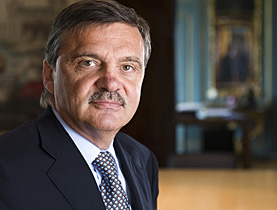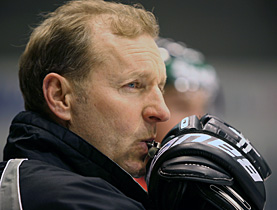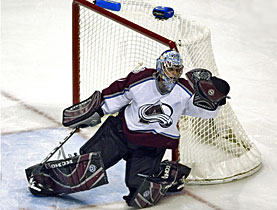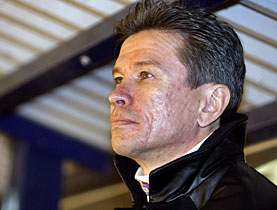“In ice hockey, David can beat Goliath”

That the Swiss ice hockey squad could beat one of its powerful European rivals is not outside the realm of possibility, says the sport's top executive.
But René Fasel told swissinfo that any unexpected triumph at the International Ice Hockey Championships will come only after solid preparation. Switzerland will host the tournament from April 24 to May 10.
The president of the International Ice Hockey Federation (IIHF) predicted the contest would also generate massive spectator interest and build on a growing momentum for the game in Switzerland.
Fasel added he was optimistic that the sport would grow in non-traditional markets, such as China. Of approximately 1.3 billion Chinese, only 200 are registered players.
swissinfo: In January the Zurich Lions won the Champions Hockey League title against the Russian team Metallurg Magnitogorsk. What does the victory mean for Swiss ice hockey?
René Fasel: It came unexpectedly. It shows that in ice hockey, David can beat Goliath. It’s also a signal that smaller nations like Switzerland can, with serious work, concentration and enthusiasm, beat the Swedes, Finns, Czechs and Russians.
swissinfo: Do you know yet which games you will attend?
R.F.: No, I always decide at short notice and according to my feelings. There will be at least two sets per day. There will very good games both in Bern and Kloten. Fortunately, the distance between the two is very short; the train ride is just over an hour.
swissinfo: What level of play do you expect from Switzerland, the host country?
R.F.: Ralph Krueger has done a very good job. As the pressure of a home tournament is higher, he will have to specially prepare the players to play before a home crowd. The players should also not be over-excited because the group with Russia, Germany and France is not easy.
swissinfo: A world championship is always a showcase for the host country. What are your goals in this respect?
R.F.: We always try to motivate the organisers, build new rinks or renovate existing ones. We have almost always achieved this in the past ten years. In Bern, the PostFinance Arena has been totally renovated. There have also been necessary investments in Kloten.
On a sporting level I hope the world championship brings new momentum to Swiss ice hockey, similar to the European football championship in 2008 or the 2003 world ski championship in St Moritz.
swissinfo: Ice hockey is less popular than football. You have started the Champions Hockey League and the Victoria Cup. Do you have new ideas for the world championship?
R.F.: The current format with 16 teams is always something organisers are discussing. One proposal is to reduce the tournament to 14 teams, divided into two groups of seven. The two finalists would have to play nine matches within two weeks, which would clearly be too much.
Another option would be two groups of six. But that has the disadvantage that four countries could not take part, which would be against what we are trying to do: make ice hockey more popular.
For example, Hungary has qualified for the world championship for the first time. Even though the Hungarians will have a difficult time in Switzerland, there is a real ice hockey euphoria in that country. That is exactly our goal. So I stand behind our model with 16 teams. The world championship offers the highest level of ice hockey, which will be rewarded with a huge audience interest.
swissinfo: North America, according to the National Hockey League (NHL), is a separate ice hockey planet. How do you intend to reduce this divide?
R.F.: We’ve done this in recent years. Our goal is to bring the two worlds together. Sure, the club owners and the NHL players’ union will represent their own interests.
We must also not forget that the NHL and its 30 teams achieve annual revenues of $2 billion [SFr2.3 billion]. There are also more business elements. Nevertheless, relations are relatively good.
swissinfo: Europe is a two-class ice hockey society: Russia, Sweden, Finland and the Czech Republic all warm up against each other, whereas Switzerland always ends up with Germany and its “favourite enemy”, Slovakia. Swiss fans would prefer to see their players mingling with the big boys.
R.F.: Sure. But that is the task of the national associations. It’s a financial issue. The four big teams battle each other in four tournaments, which generate significant revenues. They don’t have as much interest in playing Switzerland, Germany or France.
One idea though would be a European cup for national teams or a European championship. I am working with the big teams to find a solution that also works for the smaller ones.
swissinfo: China, a sporting superpower, is currently missing from the ice hockey map.
R.F.: The potential in China is immense. Whenever I ask how many registered hockey players there are in China, people always answer ‘millions’. But of the approximately 1.3 billion people, there are around 200. Not millions, not thousands, but 200!
Of the roughly 700 million Chinese women, 62 are registered. Nevertheless, the women’s team has surprisingly qualified for the 2010 Vancouver Olympics.
We’re investing a half a million francs for ice hockey in Asia each year. Above all, many new rinks are needed. If we make only slight progress, China will still surely be a factor.
The city of Harbin is aiming for the 2018 or 2022 Winter Games. If that is successful, there would be an incredible boom for winter sport in China.
swissinfo-interview: Renat Künzi
The 2009 Ice Hockey World Championship takes place from April 24 to May 10 in Bern and Zurich.
Over 300,000 spectators are expected to attend and another 800 million will watch on television.
It is the tenth time Switzerland has hosted the tournament.
Born in 1950 in Fribourg. He is married, has four children and is a dentist by training.
Fasel played for Gottéron Fribourg, then began his career as an international arbitrator.
In 1985 he was elected to the Swiss Ice Hockey Federation.
In 1994 he became president of the IIHF.
In the summer of 2008 he joined the executive committee of the International Olympic Committee. He is responsible for the entire winter sport division.
Preliminary round
The tournament’s 16 teams are split into four groups of four. Each team plays three matches in round robin play. The top three from each group move to the qualifying round.
Qualifying round
The remaining twelve teams are divided into two groups of six. Each team has to play three games within their group.
Quarterfinal
The top four teams from each group make it to the quarterfinal. The bottom two teams from each group are eliminated.
Semifinal
The top four teams from the quarterfinal move to the semifinal.
Bronze medal game
The two losers of the semi-final games face off.
Final
The winners of the semi-final round play the tournament’s final match.

In compliance with the JTI standards
More: SWI swissinfo.ch certified by the Journalism Trust Initiative



You can find an overview of ongoing debates with our journalists here. Please join us!
If you want to start a conversation about a topic raised in this article or want to report factual errors, email us at english@swissinfo.ch.